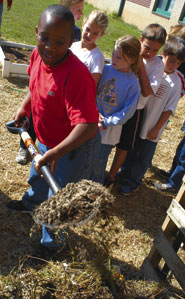Cultivating Knowledge

Excited chatter filled the autumn air as fourth-graders at Hampton Cove Elementary School in Madison County waited in line for a chance to toss soil on top of a compost bin. While the students took turns, volunteers and teachers quizzed the enthusiastic class about lessons the students are learning from the Junior Master Gardener program.”I like seeing what all goes in the compost pile, but my favorite part was planting the seeds in the garden and seeing my plant come up. It’s cool,” said Collin Parker, 10.Collin is among thousands of students statewide who are learning about gardening and nature as they earn Junior Master Gardener (JMG) certificates. Developed by Texas Cooperative Extension and the Texas A&M University System, JMG is a 4-H youth gardening program designed to engage children in hands-on learning experiences that promote an appreciation for the environment while enhancing academic studies. The gardeners cover such topics as plant development, soil science, ecology, entomology, landscape horticulture, fruit and vegetable production and career exploration. Initially, JMG groups were started in 15 Alabama counties, but the program has grown to include hundreds of clubs–most led by community volunteers.Madison County Extension Agents Kenneth Creel and Tyrone Smith were among the first to “plant” JMG clubs in Alabama. “I had a vision of having gardens at as many schools as possible in the county,” Creel said. “We wanted to get kids back interested in gardening. This program not only teaches the kids about gardening but all of the natural sciences.”Today, Madison County has 17 JMG clubs scattered among public and private schools as well as home schools and after-school programs. Creel said most of the groups are coordinated by volunteers who have completed the Extension System’s adult Master Gardener program. Master Gardener Betsy Banner is among the volunteers teaching the JMG program at Hampton Cove. She said the children love working in the raised-bed garden, and the teachers appreciate how the program encourages students to use what they learn in their academic classes.”It teaches children in a fun way,” Ms. Banner said. “Kids sometimes struggle in class, but everyone can contribute here. It’s a way of reaching kids in a non-traditional way. It also gives them confidence in exploring their world.”Hampton Cove Elementary School is just one example of how JMG is cultivating the minds of young people. In Huntsville’s inner city, teachers and volunteers are incorporating JMG into a comprehensive effort to revitalize the neighborhood around Lincoln Elementary School. And in Moulton, Ala., JMG students started a campaign for a state bottle- and can-recycling law based on an environmental impact study of their campus.
Extension Agent Cynthia Knowlton said the program has had a similar effect on students in Baldwin County.”One of the greatest benefits is the students are learning about plant science and ultimately about where food comes from,” she said. “They learn that food doesn’t just appear in the grocery store. There is a process that involves the soil, farmers, harvesting and processing. The kids love it because it’s hands-on rather than being a class where they are just sitting there being taught. With the Junior Master Gardener program, they can actually work in the garden.”For information about the Junior Master Gardener program, contact your local Extension System office or visit www.aces.edu/jmg. Junior Master Gardener and associated logo designs are registered service marks of Texas Cooperative Extension.
